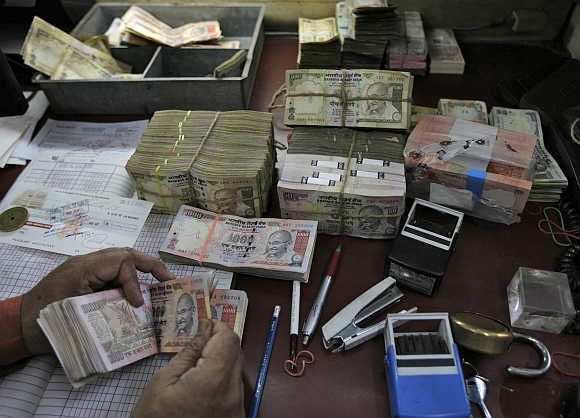
While a good monsoon might mean food inflation will moderate, there are other significant risk factors on the horizon.
Finance Minister Arun Jaitley was recently reported as suggesting that Indian savings were not being correctly deployed.
He worried that savers were using 'instruments which give you a higher return and create an interest regime which is extremely costly and makes the economy sluggish'.
This is presumably a reference to bank deposits, among others.
He indicated that it would be better if such funds went instead to instruments like bonds and shares, since these 'finance projects and economic activity'.
The finance minister’s statement raises two interlinked questions.
The first is on what it implies about the longer-term desire to ensure the financialisation of savings.
After all, remunerative and stable interest rates are crucial for small savers -- and India needs more small savers to turn to banks instead of other savings mechanisms such as gold.
If such savings are not being channelled into beneficial economic activity, then that reflects in fact on the quality of the banking system.
Instead of worrying about savers’ choices, the government should worry about incentivising the parking of bank funds in government debt, or permitting high net interest margins in the public sector banks it controls.
These are worthy priorities for the government if it wishes to revive private investment in the economy.
The second question is about what this statement reveals regarding the government’s thinking on interest rates.
By questioning the need for higher interest rates for savings instruments, the finance minister has implicitly opened up a gap between the government’s preferences and the efforts of the Reserve Bank of India over the past years to keep interest rates at a level that continue to drive down inflation.
This might be interpreted as the first signs of a new regime that would be different from the one that Reserve Bank of India Governor Raghuram Rajan has built in the last three years.
Is it that the government will now push to move away from what Mr Rajan has been doing in the last few years -- quite well, at that -- in controlling inflation?
If it is the case that the government is coming round to the conclusion that interest rates will have to be softened across the board in order to ensure that 'projects and economic activity' are financed, then the inflationary consequences will be unpredictable.
It is worth remembering that, while a good monsoon might mean food inflation will moderate, there are other significant risk factors on the horizon.
For example, the long deflationary push thanks to low commodity prices might be over; most analysts expect that crude oil prices will remain in the $50 a barrel range for much of the remainder of the year. In addition, there are domestic pressures that will have to be factored in.
The Seventh Pay Commission award has been accepted by the government, which means that there will be more money in the hands of government employees.
This might well have inflationary consequences. If the government creates pressure for lower interest rates at this moment, then these inflationary factors will be given free play.
Coming after the RBI has sought over a multi-year period to anchor inflation expectations lower, any rise in inflation would have significant medium-term effects.
The government should think carefully about reintroducing the risk of sustained inflation into the Indian economy.











 © 2025
© 2025